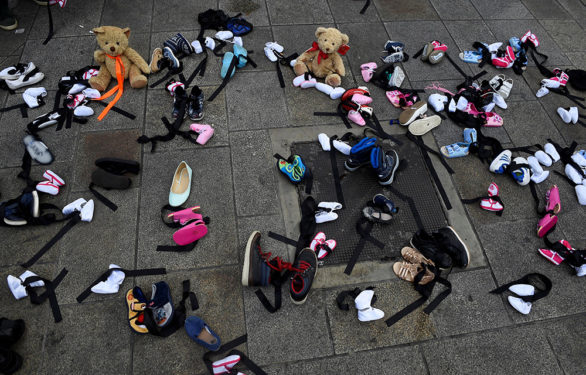By Claire Giangravè

ROME – A clerical sexual abuse survivor calls a summit on child protection that will take place at the Vatican Feb. 21-24, involving presidents of all bishops’ conferences around the world as well as the pope’s own top aides, a “last chance” for the Vatican to be taken seriously.
“If this 2019 meeting ends with nothing more than enthusiastic words about the discussions which have taken place and promises for the future, it will be the end of the road for many who have waited years for the Church to take concrete action,” said Marie Collins, Irish clerical sexual abuse survivor, in a Nov. 23 interview with Crux.
The interview took place via email.
Collins, a former member of the Pontifical Commission for the Protection of Minors, has been steadfast throughout the years in holding the Church accountable and calling for reform.
On Nov. 23, the Vatican announced the planning committee for the summit, composed of Cardinal Blase Cupich of Chicago; Archbishop Charles Scicluna of Malta, the Vatican’s leading prosecutor on child abuse; German Jesuit Father Hans Zollner, a member of the Pontifical Commission for the Protection of Minors and head of the Center for Child Protection at the Pontifical Gregorian University; and Cardinal Oswald Gracias of Mumbai, India, who also serves on Pope Francis’s “C-9” council of cardinal advisors.
The absence of Cardinal Sean O’Malley, a member of the C-9 and President of the Pontifical Commission for the Protection of Minors, has been a source of confusion for some.
But for Collins, who isn’t organizing it, the event is not as important as the practical measures that it must usher in if it wants to preserve the Church’s credibility on sexual abuse.
“What matters most about this meeting is not which cardinals will be taking part or involved in organizing it, but what will be on the agenda?” Collins wrote. “What is it intended to achieve? What concrete changes will it bring?”
At the same time, Collins pointed to another notable absence in the lineup of organizers: Archbishop Diarmuid Martin of Dublin, who has had a vast experience in a country wreaked by clerical abuse and has enacted effective measures, Collins said, for prevention and child protection.
“He has implemented his safeguarding policy rigorously for many years and has the respect of survivors and the faithful for how he has dealt with the issue and cared for victims,” she wrote. “A man with such practical experience should be at this meeting.”
According to the survivor and activist, the February gathering must be three-pronged.
- It should aim at implementing “a universal safeguarding policy across all Church entities worldwide,” Collins wrote. This policy should be aligned with Francis’s promised “zero tolerance” policy.
- Participants must “reach a decision on a clear accountability policy for all church leaders in regard to the handling of cases of the abuse of minors.”
- Finally, attendees should “discern what changes are needed to canon law to facilitate all necessary provisions in these changes to safeguarding and accountability.”
According to Collins, the reality of abuse prevention in the Catholic Church changes drastically depending on location, due to varying sensibilities of bishops and local culture and laws.
“The Church has resisted setting in place global policies to safeguard minors and to hold its leaders accountable,” she wrote, creating “huge differentials in safety depending on location.”
Collins also criticized the Church’s “obsession with secrecy,” which, she said, has not only led to unjust treatment of victims but also obstructed canonical trials.
Bishop accountability is among the main outcomes that the survivor wishes to see from the event, along with more information about who’s carrying out the investigations, what the penalties are, and making guilty judgments known to the public.
Collins also expressed the hope that the conversations that take place at the gathering, along with any documentation and deadlines, will be made public.
“There must be transparency and an end to the ambiguous words, the obfuscation and the failed promises,” she wrote.
While she does not know the identity of the survivors who will be taking part, Collins wrote that she hopes “they will be chosen from survivor advocacy groups with experience speaking of victim needs in regard to the handling of abuse, and that their identity will not be hidden.”
She described as “depressing” a recent interview with Scicluna in America Magazine, where he called the February summit “the beginning of the process.”
Collins recalled that six years ago, in Feb. 2012, the Vatican sponsored a symposium in Rome called “Toward Healing and Renewal” to combat the sexual abuse crisis, with the participation of Scicluna. Every bishops’ conference was asked to send a representative and the event held meetings, discussions and workshops.
“It was also supposed to be a ‘beginning,’ but six years have passed and we’re in exactly the same situation,” Collins wrote. “Nothing has moved.”
In a Friday interview with Crux, Cupich said the committee is “committed to achieving specific outcomes from this meeting that reflect the mind of Pope Francis.”
The same position was held by Gracias in an October interview with Crux, where he said that the February meeting “cannot be cosmetic.”
“Either it will be successful, or it will be a disaster for the Church,” he said, adding that Francis “isn’t going to call another meeting six months later, or two years later. No one is going to come and take it seriously. This is very important.”
